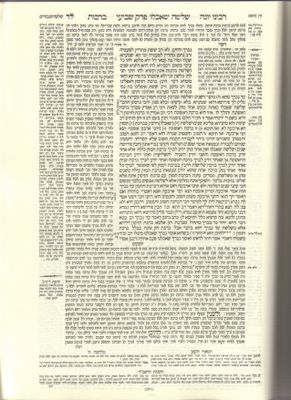
HIDE/SHOW IMAGE
34a
{Brachot 46a continued}
And we reject this, and say: No. Rav Sheshet explains according to his reasoning, and Rav Nachman explains according to his reasoning, etc.
And in this reports {=gemara}, those before me z"l {the Geonim} asked and answered regarding it, and they did not derive from it anything {lehalacha}, for they believe that this that it says in the brayta "two" and "three" {shnayim ushlosha} are brachot {blessings} and they then have a question how come it says it in masculine language {shnayim ushlosha are masculine}, and they did not find to it an answer.
And this saying which Rav Nachman and Rav Sheshet argue in, they also argue about in the Yerushalmi, and they ask there on the one who holds until Nevarech {is Birchat HaZimmun} from this brayta that: two and three they bless Birchat HaMazon. And when you delve into it you may derive an explanation to this saying, without difficulty or doubt. And we learn there as follows: {many emendations of the Bach, by the way. Check it out inside.}
Three who eat as one, and one of them wishes to leave. The house of Rav says he blesses the first blessing and goes off to himself. Rabbi Zera citing Rabbi Yirmiya said: This is HaZan. Rabbi Chelbo citing Rabbi Chelbo citing Rav: This is HaZan.
Rav Sheshet asked: But the brayta argues: "Two or three (*who ate) {masculine form by the way} - they are obligated in Birchat HaMazon {emend to HaZimmun}" - which implies four, no. And if you attempt to say this is the first blessing {Bach: --> this is the Birchat HaZimmun} let the brayta say four. They found a variant brayta that said four. And if you attempt to say that this {fourth} is HaTov VeHaMeitiv {"The Good and the Benevolent" - the fourth blessing}, it is different from the rest, for Rav Huna said: HaTov VeHaMeitiv they established when the slain of Beitar were allowed to be buried. HaTov - that they did not rot. VeHaMeitiv - that they were allowed to be buried.
And we find that we say that the "two and three" that they learned {in the brayta} refer to people {rather than blessings}. And here is its explanation:
Two or three who ate as one - and none of them knows how to bless the entire Birchat HaMazon, but one knows the first blessing and the second knows the second and third {blessing}, and does not know the first blessing; or one knows how to bless the first blessing, and one knows how to bless the second blessing, and one knows how to bless the third blessing - they are obligated in Birchat HaMazon - since it is possible for each of them to bless the single blessing that he knows, and it will emerge that Birchat HaMazon will come up from two or three of them. And we learn from here trhat Birchat HaMazon with Birchat HaZimmun is only three blessings, and therefore it is only split amongst three people, and because of this it {the brayta} learnt "two or three" and did not say "four." For if it were so that the Birchat HaZimmun is {only} until Nevarech it should have said "four." And we answer that we found a brayta that said four. And we are saying like it {that brayta, and thus it is until Nevarech}. And if you say that this brayta that said four, because of HaTov VeHameitiv it learnt it that we can then say there is a fourth person, you may not say this, for the blessing of HaTov VeHaMeitiv is Rabbinic, and the Tanna would not list it amongst Biblical {blessings}, for Rav Huna said ... .
Such is the explanation of the Yerushalmi, and it shares its meaning with our own {Bavli} gemara, and we already derived the explanation of this brayta appropriately, and there is not to it any difficulty whatsoever. And we establish like Rav Nachman that until Nevarech {is Birchat HaZimun, and so do the people do, for an individual, when he blesses {Birchat HaMazon} he begins from the blessing of HaZan {and not Nodeh}; thus it is clear that Birchat HaZimmun, which is only said with three, only extends to Nevarech, but the blessing of HaZan is not in the scope of Birchat HaZimmun.
{Brachot 46b}
To where does he return, when he says Nevarech SheAchalnu MiShelo? Rav Zevid, citing Abaye, said: He returns to the head and says Nevarech SheAchalnu another time. And the Sages say to the place
It's been a while...
-
I've been blogging a bit on Substack, at Scribal Error. While focused more
on gemara and girsaot, I just had a post on Rationalism and Midrash. Check
ou...
3 years ago



No comments:
Post a Comment